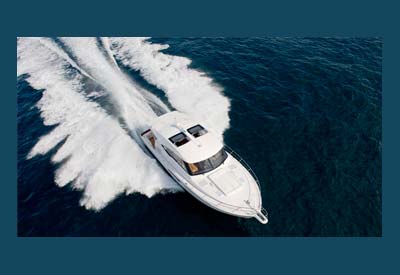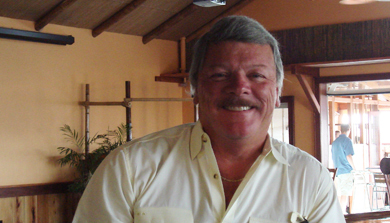VOLVO PENTA IPS RULES THE WAVES

December 19, 2015
The Riviera 515 SUV, equipped with fuel-efficient twin Volvo Penta IPS 950 pod drives with two Volvo Penta D11-725 engines.
High seas, sheer-sided waves, torrential rain and gale-force winds would stop most yachts in their tracks. But the Riviera 515 SUV’s exceptional sea handling capabilities indicate that the North Atlantic Ocean has finally met its match.
The Riviera 515 SUV, equipped with fuel-efficient twin Volvo Penta IPS 950 pod drives with two Volvo Penta D11-725 engines.
Last month, experienced seafarer Captain Stan Mawyer was charged with delivering a new Australian-designed and built Riviera 515 SUV from Boston, Massachusetts, to Fort Lauderdale, Florida. The 1,250 nautical mile journey would be rough, and Captain Mawyer anticipated needing to duck into the Intracoastal Waterway (ICW) during the journey to avoid the perilous conditions on the East Coast’s open waters.
“Looking back at our journey after arriving in Fort Lauderdale, it’s remarkable to consider what the Riviera 515 was able to achieve,” says Mawyer. “With its impeccable rough sea capabilities, it seems this Riviera is able to defy the laws of gravity.”
Released almost 18 months ago, Riviera 515 is a sporty and adventurous yacht, equipped with the fuel-efficient twin Volvo Penta IPS 950 pod drives with two Volvo Penta D11-725 engines. As an industry leader, Volvo Penta is a natural choice for blue water flybridge and sport yachts, and its engines perform especially well in challenging offshore weather conditions. And, as a long-term advocate of the pod drive system, Riviera’s partnership with Volvo Penta has produced an integrated yacht that is unintimidated by the high seas.
 Captain Stan Mawyer, who sailed the Riviera 515 SUV from Boston, Massachusetts, to Fort Launderdale, Florida.
Captain Stan Mawyer, who sailed the Riviera 515 SUV from Boston, Massachusetts, to Fort Launderdale, Florida.
Strong yachts for long voyages
At home in Australia’s waters, where long journeys and rough seas are commonplace, the Riviera 515 is a robust vessel. Nevertheless, on a 300- or 400-nautical mile journey, having faith in your yacht’s ability to get you from port to port is important. Thanks to the D11’s impressive fuel economy, Captain Mawyer and his crew were able to travel 0.5 nautical miles per gallon at an average cruise speed of 27 knots.
“I was very impressed with the yacht’s overall fuel consumption,” he says. “Cruising at an average of 27 knots in fairly high seas, the fuel use was very economical.”
In addition to the Riviera 515’s economical use of fuel, Volvo Penta’s Autopilot feature, an integrated part of the EVC system, made the journey comfortable and stress-free. Allowing the captain excellent control of the course, the Autopilot reduced the fatigue on the crew during the relentless weather.
“It’s almost unheard of for a captain to be at the helm of a vessel for 11 solid hours without feeling fatigued,” Mawyer says. “But, thanks to Volvo Penta’s Autopilot feature, which still automatically engages after any manual course change, we were able to stay alert for longer — a real bonus in the persistent rain and wind.”
Towards the middle of the Riviera’s journey, Captain Mawyer and the crew were in Beaufort, North Carolina, about to embark on the third leg on their East Coast voyage. With 30-knot winds and 10-foot waves out to sea, it was expected that the journey to North Myrtle Beach, South Carolina, would be made via the ICW. But, given the Riviera’s exceptional performance during the first and second legs, the captain decided to test the vessel on the open water. “The seas were ugly and, as we made our way out of the shallow coastal waters, the winds started raging in an easterly direction,” Mawyer says.
“In any other yacht, including my own, I would have terminated the ‘experiment’, but by reducing the throttle to 19 knots, the Riviera remained stable and we dropped off the sheer-sided waves into the troughs with relative comfort and ease. My crew and I have never experienced this level of steadiness and handling in all our years at sea.”
Regardless of rough weather, the Riviera’s seamlessly integrated Volvo Penta IPS pod system offers unparalleled comfort, stability and safety. And, the Volvo Penta Interceptor trim system gets the Riviera up on the plane quickly, compensates for strong winds and gives the boat its most favorable running angle.
“After delivering the Riviera 515, I was beyond impressed with the capabilities of Volvo Penta IPS. After owning my own conventional shaft drive yacht, I can now see the benefits of converting to the pod system,” says Mawyer. “The safety and comfort of this yacht are unparalleled by anything I’ve tested before. My only regret from the journey is that I cannot purchase one for myself.”



























